Food Allergen Awareness Training
Quantity: 1

Duration 1-2 hours
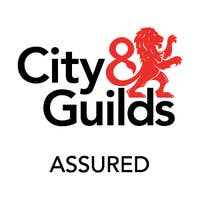
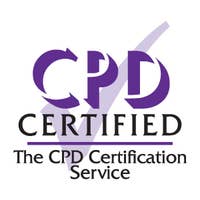

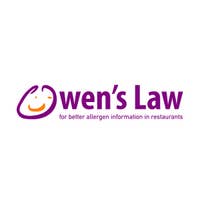
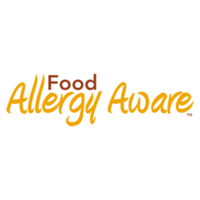

100% online training
Start when you like
Learn on any device (desktop, mobile or tablet)
Instant assessment and result
1 learner per course
Train teams of all sizes
Bulk discounts starting at 10% off 10 courses
Pay by invoice with 30 day payment terms available (5+ courses)
Includes a 10% discount for 10+ courses
Food Allergen Awareness Training is important for anyone who prepares or serves food in retail and catering settings. It provides an understanding of food hypersensitivities and allergens, how they affect customer safety, and how to communicate allergen information effectively. It also ensures you know how to comply with UK allergen laws, including Natasha's Law, so your customers receive accurate ingredient information.
Designed by experts, this online Food Allergy Awareness course (also known as Level 2 Food Allergen Awareness Training) will teach you how to comply with the UK's allergen laws and help you understand which foods commonly cause reactions in food-hypersensitive customers. This course will explain how allergenic ingredients should be labelled on food products under the Food Information for Consumers (FIC) Regulation (as retained in UK law) and how to ensure your customers can make an informed decision about the food they consume.
Food Standards Agency (FSA) guidance states that food businesses must make sure their staff receive training on allergens.
100% online training
Access anywhere
Same day digital certificate
Printed certificate posted next working day
Full audio voiceover
Assessment retakes at no extra cost
Learn at your own pace with no completion deadlines
Developed by food safety professionals
Ensures compliance with the Food Information for Consumers (FIC) Regulation as retained in UK law
Up to date with current allergen legislation in the UK, Natasha's Law and prepacked for direct sale (PPDS) labelling requirements
City & Guilds Assured
Accredited by CPD, endorsed by the Institute of Hospitality and the Owen's Law Campaign
Downloadable module recaps of key learning points
Bulk discount for orders of 10+ courses

Save on our courses when you buy more training upfront. Lock in a better price now and access the training whenever you need to. You can mix and match any of our courses too and get the discount off your whole order.
10+ courses = 10% off
50+ courses = 20% off
100+ courses = 30% off
500+ courses = 40% off
By the end of this Food Allergen training course learners can:

City & Guilds Assured
Thoroughly reviewed independently by City & Guilds learning and development experts, this course is approved as City & Guilds Assured. High Speed Training is the first e-learning provider to have online courses awarded City & Guilds Assured status.
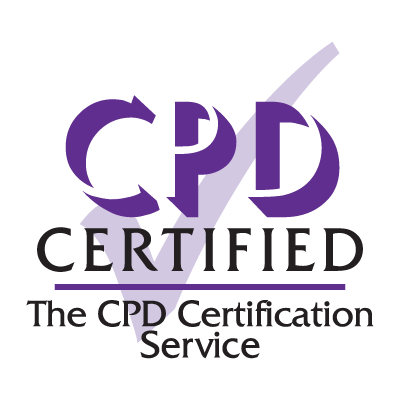
Accredited by CPD
All of our courses are accredited by the CPD Certification Service as conforming to universally accepted Continuing Professional Development (CPD) guidelines.

Endorsed by the Institute of Hospitality
Additionally, this course is endorsed by the Institute of Hospitality as providing independently-evaluated, quality content that teaches good practice standards.

Endorsed by Owen’s Law
High Speed Training is proud to be the first training provider to receive an official endorsement from the Owen's Law Campaign. Owen's Law requires that best practices be followed, including for allergens to be clearly stated on the face of menus, for staff to initiate a discussion with customers about food hypersensitivities and for thorough ingredient lists to be available. To support the Owen's Law Campaign, visit http://owens-law.co.uk

Endorsed by Food Allergy Aware
This training course has been meticulously audited by Food Allergy Aware, ensuring our training comprehensively meets the highest standards of accuracy and effectiveness. With the Food Allergy Aware endorsement, you can trust that our course provides essential insights into managing food allergens, safeguarding your patrons' health, and complying with regulations.
Recommended renewal:
3 years
What does this mean? This certificate does not have an expiry date, however, based on industry best practice guidelines there is a recommended renewal period.
Our in-house Learning Designers develop all of our courses to give you and your learners the most engaging training possible.
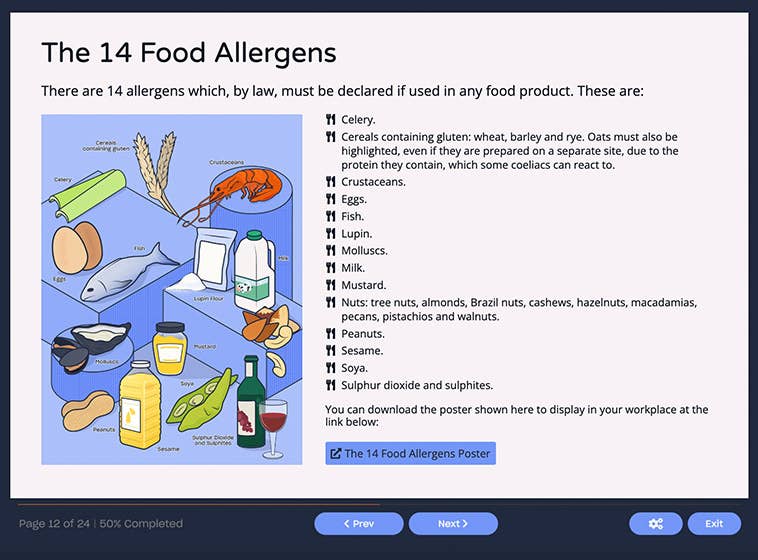
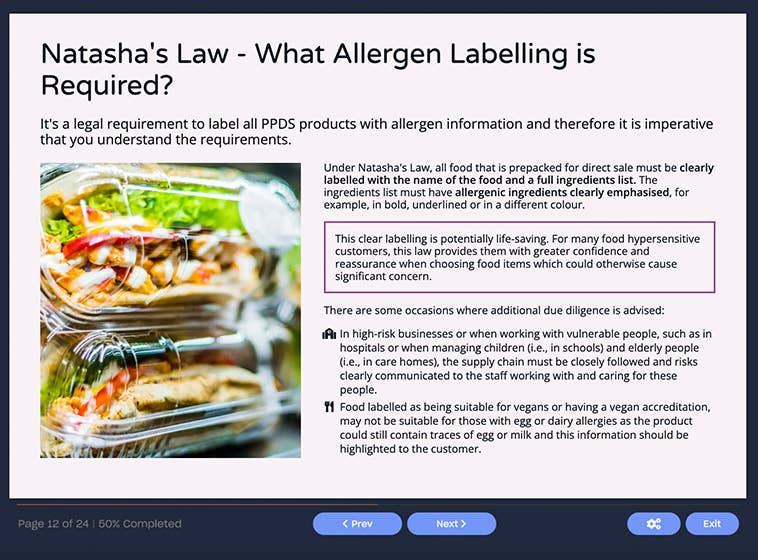
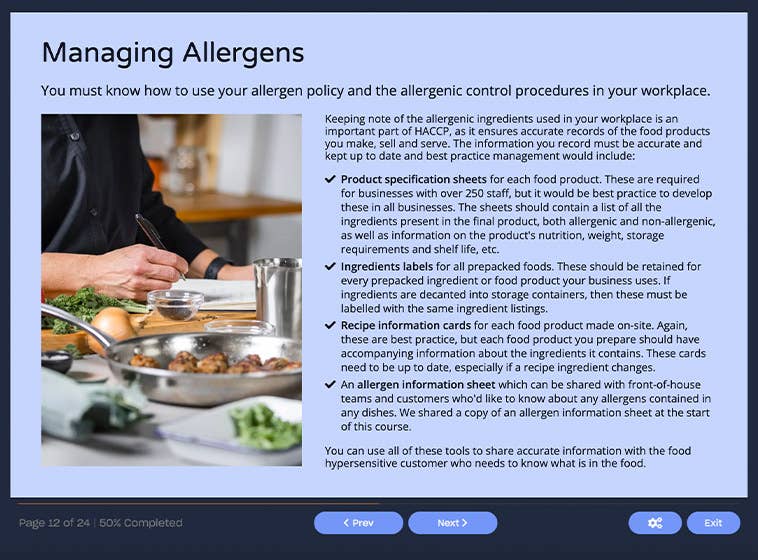
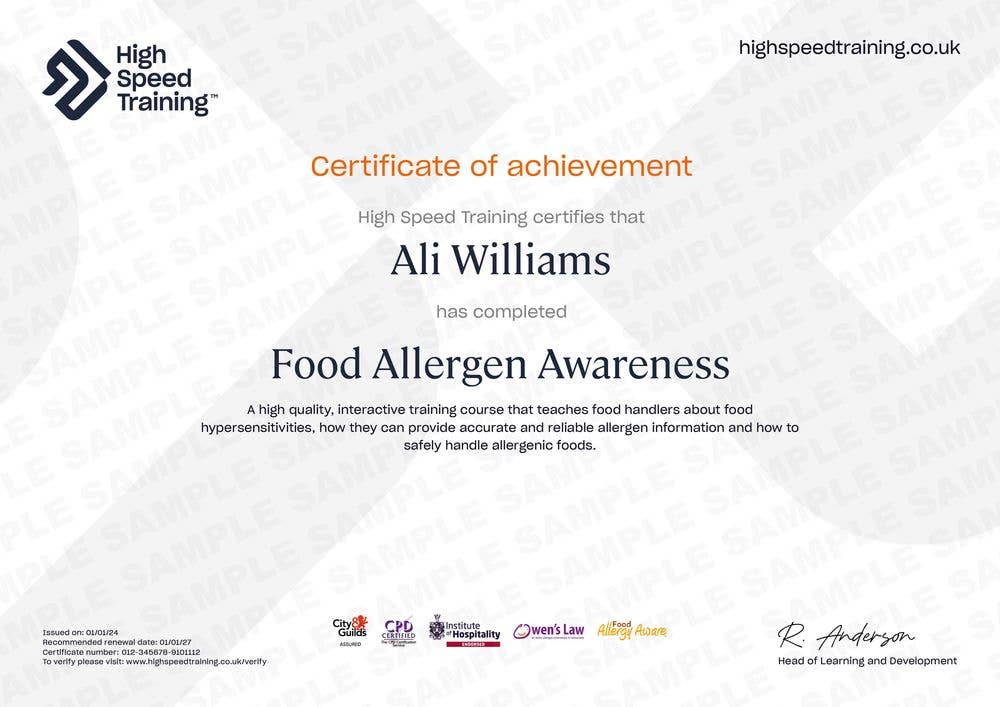




What is a food allergen, key definitions, coeliac disease and symptoms, symptoms of an allergic reaction, symptoms of anaphylaxis, food handler responsibilities, the 14 food allergens, hidden allergens, what's my role.
Food safety legislation, food labelling regulations, foods prepacked for direct sale (PPDS), allergen labelling, Natasha's Law, near miss reporting, precautionary allergen labelling, ingredients lists, loose foods, distance selling, law enforcement, staff training, communicating with the food hypersensitive customer.
Key terms, Hazard Analysis and Critical Control Point (HACCP), prerequisites, cleaning the workplace, food deliveries and transportation, food storage, food preparation, food service, allergen policy, emergency situations.
The online assessment is taken on completion of the training material. You will be asked 20 multiple choice questions with a pass mark of 90%. The answers are marked automatically so you will instantly know whether you have passed. If you don't pass don't worry! You can take the test as many times as you need with no extra charge.
This course is best suited for staff who work in catering or retail settings. The course is appropriate for workers at all levels, whether they prepare, handle, sell or serve food products.
This includes, but is not limited to, staff that work in:
If you work in food manufacturing then our specifically designed Food Allergens in Manufacturing course will be more suitable.
Food allergen management is essential. See our free Food Allergen Policy Template for guidance.

In partnership with
Caroline Benjamin
Food Allergen Training Consultant
Caroline Benjamin (MIH) is a multi-award-winning food safety expert and the founder of Food Allergy Aware. With a long career of hands-on hospitality and catering management, Caroline possesses a deep understanding of the challenges food businesses face.
Recognised for her expertise, Caroline was commissioned by the Royal Society for Public Health (RSPH) to create the official training resources for their Level 2 Award in Identifying and Controlling Food Allergy Risks. Her authority is further validated by multiple awards from The Society of Food Hygiene and Technology (SOFHT) and invitations to speak to hundreds of professionals for bodies like CIEH and HABC. Her work has even had an international impact, having offered guidance and training to Dubai Municipality food safety officers.
Caroline is a passionate advocate for consumer safety, leading the industry-wide 'Near Miss Reporting' campaign to prevent future tragedies and serving on the local committee for Coeliac UK.
Anyone involved in the handling, preparation, or sale of food requires allergen training. This legal requirement applies to all staff, from kitchen and front-of-house teams to managers and business owners. Training ensures everyone understands their role in protecting customers and complying with UK food safety law.
The 14 named food allergens that must be legally declared in the UK are:
- Celery.
- Cereals containing gluten.
- Crustaceans.
- Eggs.
- Fish.
- Lupin.
- Milk.
- Molluscs.
- Mustard.
- Peanuts.
- Sesame.
- Soybeans.
- Sulphur dioxide/sulphites.
- Tree nuts.
By law, food businesses must provide consumers with clear information on these specific ingredients to prevent allergic reactions.
All of our training is done within your web browser - there are no apps to download or software to install.
After picking the courses you need and completing your purchase, you will receive a confirmation email. To access our courses yourself or to distribute them to others you just need to click the ‘Get Started’ button within the email and select which option you want. You will then be able to add the course(s) into an existing account, or create a new account.
Of course just add the amount of courses you need and follow the purchase process. Please do be aware that it is one course per learner so they will all need their own course.
When buying courses for a team you'll also get access to our Management Suite free of charge. This is a tool that will allow you to allocate, track and review the training of your team.
Did you know? - We offer free training sessions on how to get the most from your Management Suite. To benefit from this, please contact: managersupport@highspeedtraining.co.uk to get your session booked in.
Yes, our bulk discounts are automatically applied to orders containing any combination of courses. We offer the following discounts on bulk purchases:
If you purchase 10+ courses you receive a 10% discount
If you purchase 50+ courses you receive a 20% discount
If you purchase 100+ courses you receive a 30% discount
If you purchase 500+ courses you receive a 40% discount
You can pay for our training using either a Debit or Credit card.
For companies ordering 5 or more courses, you’ll also be given the option to pay by invoice. If you would like to pay by invoice for fewer than 5 courses then please contact our Sales Team by calling 0333 006 7000 or emailing us at sales@highspeedtraining.co.uk.
Yes. You can use your username and password to log in and revisit the training material as many times as you like, even after completing the course.
No, we want our courses to work around you so there’s no time limit in which you must complete the training after making a purchase. You can also split your training over as many different sessions as you wish, as course progress is saved as you make your way through the training. You’re free to learn entirely at your own pace.